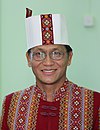
The National Unity Party (NUP) is a political party in Myanmar (Burma). It is the successor to the Burma Socialist Programme Party (BSPP), which ruled the country from 1962 to 1988. The party's headquarters are in Bahan Township, Yangon.
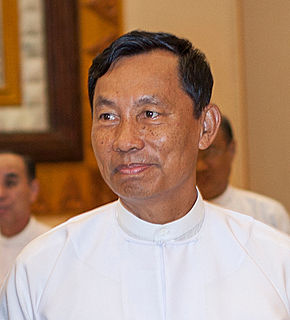
Thura Shwe Mann is a Burmese politician who was Speaker of the Pyithu Hluttaw, the lower house of parliament from 31 January 2011 to 29 January 2016. He is a former general and, whilst being a protégé of senior general Than Shwe, was considered the third most powerful man in the State Peace and Development Council (SPDC), which ruled Myanmar until 2011.

The president of the Republic of the Union of Myanmar is the head of state and constitutional head of government of Myanmar. The president leads the Cabinet of Myanmar, the executive branch of the Burmese government. The current president is Myint Swe, who assumed the presidency in an acting capacity through a military coup d'état on 1 February 2021.

Thein Sein is a Burmese politician and retired general in the Myanmar Army who served as the eighth President of Myanmar from 2011 to 2016. He previously served as Prime Minister from 2007 to 2010, and is considered by many in and outside Myanmar as a reformist leader in the post-junta government.

The National Democratic Force (NDF) is a political party in Myanmar (Burma). It was founded by former members of the National League for Democracy (NLD) who disagreed with the party leadership's decision to boycott the 2010 general election.
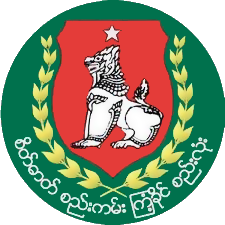
The Union Solidarity and Development Party is a political party in Myanmar, registered on 2 June 2010 by the Union Election Commission and currently standing as the largest opposition party in the bicameral Assembly of the Union. It is the successor to the formerly ruling military junta's mass organisation, the Union Solidarity and Development Association. The party was headed by President Thein Sein until 2013, and its headquarters are in Naypyidaw's Dekkhinathiri Township. It is known for its close ties with the military and most of the party officials are former military personnel. The party supported the 2021 Myanmar coup d'état, as well as the military junta during the subsequent protests by the public.

The Pyidaungsu Hluttaw is the de jure national-level bicameral legislature of Myanmar established by the 2008 National Constitution. The Pyidaungsu Hluttaw is made up of two houses, the Amyotha Hluttaw, a 224-seat upper house as well as the Pyithu Hluttaw, a 440-seat lower house.

The Rakhine Nationalities Development Party was a political party in Myanmar (Burma), representing the interests of the Rakhine people in Rakhine State and Yangon Region. The party contested 44 seats, of which it won 35. RNDP was the largest party in the Rakhine State Hluttaw, the sole State or Region Hluttaw whose largest party was not the Union Solidarity and Development Party following the 2010 General Election. The party was at times accused of stirring up anti-Muslim feelings.
The Cabinet of Myanmar, officially the Union Government, is the executive body of the government of Myanmar led by the prime minister of Myanmar. The Provisional Government serves as the current cabinet.

May Win Myint is a Burmese politician, physician and former inmate who is currently serving as a Pyithu Hluttaw MP for Mayangon Township and member of the National League for Democracy's Central Executive Committee.
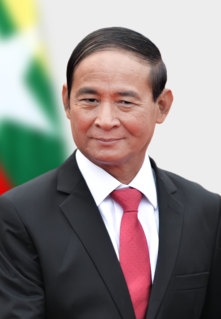
Win Myint is a Burmese politician who served as the tenth president of Myanmar from 2018 to 2021. He was removed from office in the 2021 Burmese coup d'état. He was the Speaker of the House of Representatives of Myanmar from 2016 to 2018. He also served as a member of parliament in the House of Representatives from 2012 to 2018. Win Myint was viewed as an important ally and placeholder for State Counsellor Aung San Suu Kyi, who served as the actual head of government but was constitutionally barred from the presidency.
General elections were held in Myanmar on 8 November 2015, with the National League for Democracy winning a supermajority of seats in the combined national parliament. Voting occurred in all constituencies, excluding seats appointed by the military, to select Members of Assembly to seats in both the upper house and the lower house of the Assembly of the Union, and State and Region Hluttaws. Ethnic Affairs Ministers were also elected by their designated electorates on the same day, although only select ethnic minorities in particular states and regions were entitled to vote for them.
The Presidential Electoral College is an electoral college made up of MPs that elects the President of Myanmar.
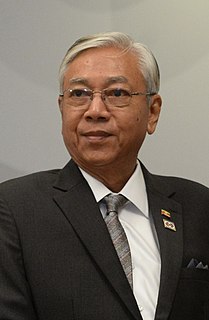
Htin Kyaw is a Burmese politician, writer and scholar who served as the ninth president of Myanmar from 30 March 2016 to 21 March 2018. He was the first elected president to hold the office with no ties to the military since the 1962 coup d'état. The second son of scholar Min Thu Wun, Htin Kyaw had held various positions in the education, planning and treasury ministries in prior governments.
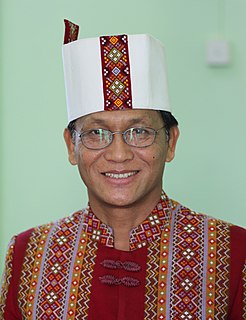
Henry Van Thio is a Burmese politician who is the Second Vice President of Myanmar since 30 March 2016. He previously served as a member of Amyotha Hluttaw. In the 2015 election, he contested and won the Chin State No. 3 constituency for a seat in the country's upper house. He was sworn in as the Second Vice President on 30 March 2016.
General elections were held in Myanmar on 8 November 2020. Voting occurred in all constituencies, excluding seats appointed by or reserved for the military, to elect members to both the upper house - Amyotha Hluttaw and the lower house - Pyithu Hluttaw of the Assembly of the Union, as well as State and Regional Hluttaws (legislatures). Ethnic Affairs Ministers were also elected by their designated electorates on the same day, although only select ethnic minorities in particular states and regions were entitled to vote for them. A total of 1,171 national, state, and regional seats were contested in the election, with polling having taken place in all townships, including areas considered conflict zones and self-administered regions.

The Committee Representing Pyidaungsu Hluttaw is a Burmese legislative body in exile, representing a group of National League for Democracy lawmakers and members of parliament ousted in the 2021 Myanmar coup d'état. The Committee consists of 17 members of the Pyithu Hluttaw and Amyotha Hluttaw.
A general election is expected to be held in Myanmar sometime in 2023 between 1 February and 1 August. Voters will elect representatives to both the Amyotha Hluttaw and the Pyithu Hluttaw of the Assembly of the Union. The election will be the first after the 2021 military coup d'état. Since the coup, the military has ruled the country under a state of emergency, which has been set by Acting President Myint Swe for the maximum constitutional duration of two years. The constitution requires elections be held no later than six months from the end of the state of emergency, and as such, the military has pledged to hold the election by 1 August 2023, exactly two years and six months after the coup. The military is expected to seek legitimacy for its extended rule through the election, which is unlikely to be free and fair.

Indirect presidential elections were held in Myanmar on 4 February 2011, after the 2010 general election. Members of the Assembly of the Union voted for the country's President, and two Vice-Presidents.
An indirect presidential by-election was held in Myanmar on 28 March 2018, after the resignation of Htin Kyaw. Members of the Assembly of the Union voted for his replacement.


